Illinois health department has action plan to combat measles
By Grant Morgan Capitol News Illinois — April 26, 2019
The U.S. is on pace to shatter the record of measles cases in any year since the disease was declared eliminated in 2000. Health officials are persuading parents to get their children vaccinated.
SPRINGFIELD — The Illinois Department of Public Health announced a slate of initiatives to increase vaccination rates statewide.
There have been seven cases of measles in the Land of Lincoln so far this year, and more than 600 in 22 states around the country.
“We are taking the threat posed by a rise in measles cases very seriously and are committed to taking action to keep Illinoisans safe,” Democratic Gov. J.B. Pritzker said in a news release.
The initiatives include a marketing campaign to combat “extensive misinformation” about vaccines, and bringing temporary mobile clinics to under-vaccinated neighborhoods and highly-attended community events, such as fairs, celebrations and religious gatherings.
“I’m glad they are addressing it and taking it seriously,” said Tom Hughes, executive director of the Illinois Public Health Association, an advocacy group for local health departments and public health workers.
Hughes’ organization is starting a similar campaign to increase vaccination rates and education. He doesn’t know whether the state department will work with the Health Association.
 “I don’t know if there’s a role for IPHA to play in this, but we’ll do whatever we can to support it,” he said.
“I don’t know if there’s a role for IPHA to play in this, but we’ll do whatever we can to support it,” he said.
The department’s announcement also outlined its plan to assess schools with student vaccination rates of less than 95 percent. It cited transportation, health clinic hours, complicated paperwork and long wait times as the main barriers to completing routine vaccinations.
According to current law, all Illinois students must be vaccinated to attend school, but some children do not get inoculated because of religious exemptions or lack of school enforcement.
“Vaccination is our best tool to protect our families,” IDPH Director Ngozi Ezike, an internist and pediatrician, said. She was appointed to Pritzker’s administration in late January.
Ezike added that while the state’s overall vaccination rates are “strong,” some areas remain vulnerable to outbreaks if just one person is infected.
A spokesman for the Department of Public Health did not respond to questions about the initiatives’ specifics — including cost and a timeline for rollout — in time for publication.







